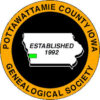Excerpts from the 1907 History of Pottawattamie County
Before the present town of Macedonia was laid out, J. B. Stutsman, one of the first merchants of Council Bluffs, had bought a half interest in a mill with William Martin and in 1851 they erected a saw mill and in 1853 a grist mill, which was managed by Z. Losh. In 1861 a flood took out the mill and the site was abandoned. But for a long time before and after the place was called Macedonia it was called Stutsman’s Mill.
With the advent of the C.B. & Q. branch railroad, the new town of Carson sprang into existence. That company commenced building a branch from Hastings on their main line, and had it completed and trains running to a point three-quarters of a mile east of the old town of Macedonia at the river on the Fourth of July, 1880. Here a new town was laid out and also called Macedonia. This company consisted of Hon. B. F. Clayton and R. H. Woodmancy of Macedonia, T. J. Evans of Council Bluffs and T. J. Pattee, general manager of the C.B.&Q. Railroad.
The first store erected in the new town was by R. H. Woodmancy, the first carpenter shop by J. T. Bird, and the blacksmith shop by Henry Keeler and Co. The Cumberland Presbyterian Church organized a society as early as 1871, under the auspices of Rev. J. W. Carter. From the date of its organization until 1880, services were held in the schoolhouse in old Macedonia, but in the fall of 1880 they erected a neat edifice in the new town at a cost of $2,000 without incurring any debt.
The first child born in the new town was in September, 1880, to Mr. and Mrs. William Dye, and the first death was that of Mrs. Emma Mitchell in the same month. The first marriage ceremony was performed by Rev. J. W. Carter in the marriage of Mr. Charles Beesley and Miss Ora Lowe in August, 1881.
The Odd Fellows Lodge was established on the fourth of February, 1881, with W. Dye, E. L. Cook, A. M. Cole, E. A. Vanvranken, A. S. Staggers and J. S. Rainbow as charter members. The officers installed were: W. Dye, N.G.; A. M. Cole, V.G.; E. L. Cook, secretary; and E. A. Vanvranken, treasurer.
The first hotel was the Macedonia House and was opened by George H. Kaler. The post office was removed from the old to new Macedonia and Ohio Knox was made postmaster and through his efforts it was declared a money order office.
A joint stock company was organized in 1880 to conduct a banking business under the laws of Iowa, and known as the Macedonia bank, the shareholders being George Meckelivert, Richard Meckelivert, D. L. Hinshimer, of Glenwood, and William Dye of Macedonia.
The Masonic fraternity established themselves in the town shortly after it was laid out, Ruba Lodge being organized in the winter of 1881, with a membership of 17. John Craig was made the first worshipful master; J. M. Kelley, the first senior warden; D. L. Bulla, the first junior warden; Ohio Knox, secretary; B. F. Clayton, treasurer; S. A. Jones, senior deacon; D. W. Bomff, junior deacon; J. W. Carter, chaplain; and A. B. Rayburn, tyler.
The most notable event in the early days was the great fire which, in March, 1882, destroyed the main part of the town, but the buildings destroyed were rapidly replaced. The terrible cyclone that wrought destruction in Grove township, passed near old Macedonia and was plainly seen from there as it passed on towards Wheeler’s Grove.
The town of Macedonia was incorporated in 1892 with the following officers: Mayor, J. M. Kelley; recorder, S. H. Hopkins; marshal and street commissioner, Wm. Marshall; treasurer, T, I. Clark; council: E. E. Smith, W. Dye, T. J. Young, E. H. Sempel, E. B. Lane, and A. I. Mitchell, M.D.
According to the authors, in 1907 the city administration was: Mayor, J. C. Rayburn; recorder, H. K. Dye; marshal, W. L. Hobson; aldermen, A. M. Miller, Grant Pilling, Milton Osler, H. A. Smith, J. M. Kelley, and T. C. Nickey.
According to the 1905 state census the town had 119 persons of school age, of which 64 were male and 59 were female.
